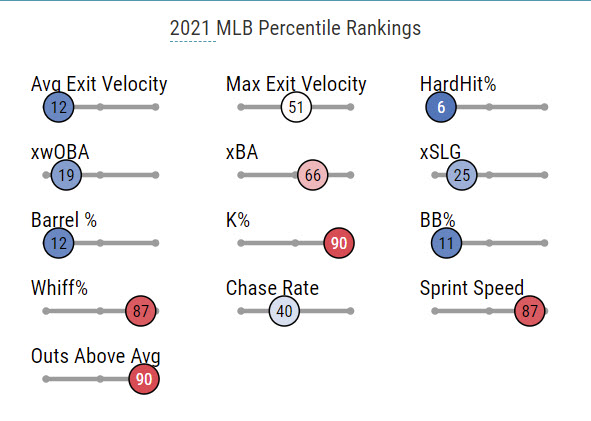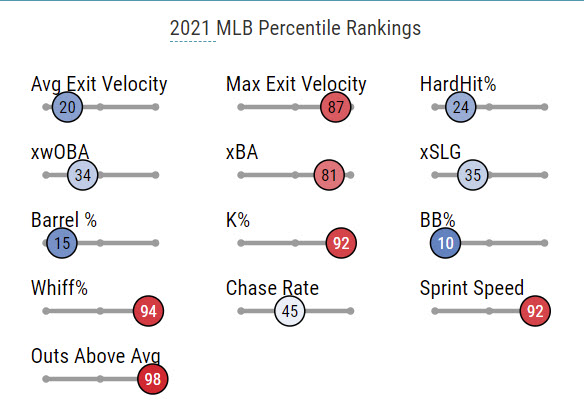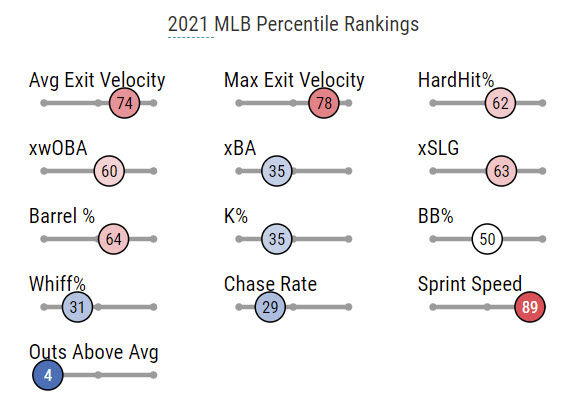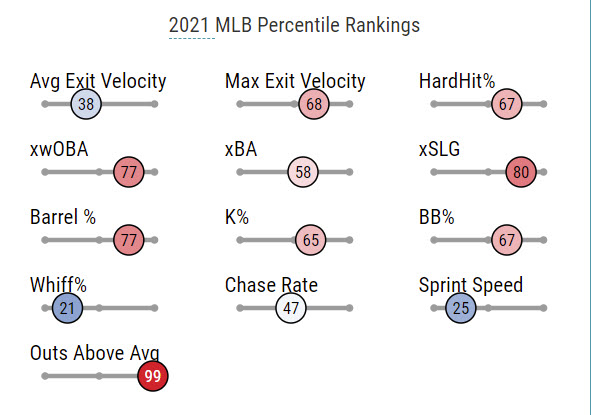As you prepare for your draft, you should look for similar players with a significant difference in ADP. We do this for several reasons. One of which is that you can comfortably attack more essential targets early in a draft if you know that a comparable player will be available later.
Nick Pollack reminds us to know our strengths as a manager in his article “The Ultimate Fantasy Draft Guide for 2022–Who to Draft and When.” If you know your hitters, but struggle with pitching, you can draft top pitchers early and fill in several lineup spots later. Nick also reminds us how much we swap out the players that we drafted in the late rounds during the season, and therefore imploring us to use “the Ms. Frizzle Method: Take chances, make mistakes, and get messy.”
The information here will help you complete an ADP comparison, so you can “get messy” with educated guesses later.
How to Make Your Own List
One simple way to find comparable players is to read the many “ADP comparison” articles published in the fantasy baseball world. Done! Build your list.
On the other hand, this means many other fantasy baseball managers will have the same list. So you might not necessarily beat the market.
There is another way to do this work on your own without taking tons of time. Go to a website, like Fangraphs, and find leaderboards from the previous year. Check the leaderboard according to a simple deeper stat. This way you can analyze the underbelly of player performance beyond the 5×5 rotisserie stats from 2021. For example, list players according to WAR or wOBA. WAR is tricky because it includes defense, which can be misleading because we don’t count defense in our scoring, but remember that this is just a starting point.
It could very well lead to a legitimate offensive comparisons too.
Once you have a list, this is where your own baseball knowledge helps (and it can be fun)! If I look at WAR initially, I can skim the leaderboard until a name pops out that doesn’t seem to be as valued as highly as the other names in the same area. Here’s a real sample list of leaders in WAR:
| Player | WAR |
| Tim Anderson | 4.3 |
| Austin Riley | 4.2 |
| Nick Castellanos | 4.2 |
| Ozzie Albies | 4.2 |
| Willy Adames | 4.1 |
| Nolan Arenado | 4.0 |
| Justin Turner | 4.0 |
| Enrique Hernandez | 3.9 |
Now, using your baseball savvy, which name stands out in this list?
For me, I love Adames in the middle rounds this year. But the best one is Enrique Hernández.
Next, I’m not simply going to draft him assuming that he’s the same as the other guys. Not yet, anyway. This first step only gives me a player to research. I have to go deeper.
If I find that it’s just a bump based on defense, then I’ll ignore it. However, if I find that it’s within the realm of possibility that he could produce as well as some of the other guys, then look what I’ve found compared to ADP! Here’s the same players with their approximate ADP.
| Player | ADP |
| Tim Anderson | 37 |
| Austin Riley | 45 |
| Nick Castellanos | 50 |
| Ozzie Albies | 20 |
| Willy Adames | 133 |
| Nolan Arenado | 52 |
| Justin Turner | 139 |
| Enrique Hernandez | 230 |
There are other criteria that factor into ADP. It’s true. Age, injury-risk, playing time, etc. Sometimes you need to weigh these issues. If I could choose between Castellanos and Hernández, sure, I’m going to take Castellanos. But it benefits me significantly to have a name like Hernández late in a draft when I’m looking for a strong hitter, one who’s going to have a ton of at-bats at the top of a lineup.
Once You Have a Name, Go Deeper
I could compare players all day. It’s half the fun of fantasy analysis. But the primary goal here is to show you three examples and urge you to look for some of your own comparisons as you prepare for the draft. I want to show that ADP can help, but it can sometimes hinder.
This first one may seem obvious, but indulge me.
Following the first step above, I looked at leaderboards for stolen bases, wRC+, and wOBA. Two players stood out: Whit Merrifield (ADP 35) and Tommy Edman (ADP 106).
| Player | Stolen Bases (rank) | wRC+ | wOBA |
| Whit Merrifield | 40 (2nd) | 91 | .306 |
| Tommy Edman | 30 (6th) | 91 | .306 |
Clearly, Merrifield is better. He’s an iron man and plays in 162 games almost every year. Still, it’s enough to make a note: “check Edman.” I went deeper.
According to Baseball Savant, here’s the MLB percentile for both players in 2021. Is this uncanny? I am NOT saying ignore Merrifield. He is a set-it-and-forget-it All-Star. If you miss him, however, don’t panic in your draft. Have a name. This is Round 2-3 in your drafts versus Round 8-9.
| Whit Merrifield | Tommy Edman |
 |
 |
If you want both of their projections for fun, here you go.
| Player Steamer Projections | HR | R | RBI | SB |
| Whit Merrifield | 14 | 90 | 62 | 29 |
| Tommy Edman | 13 | 82 | 59 | 23 |
Here’s another fun one. We all know of pitchers who failed as starters but thrived as relievers. This example is NOT that. Sometimes, I just like to consider what kind of reliever I’m buying by comparing them to an elite starter. In other words, I want top-tier starter numbers that exist in the bullpen.
Consider Minnesota’s own Taylor Rogers. I want to point him out because Rogers has an ADP somewhere near 200, but some people draft him as early as the 10th round. That’s quite a range!
I’ll take Max Scherzer out of the bullpen any day. Yup, I said it. And someone’s going to yell at me.
| xERA | K/9 | BB/9 | GB% | HR/FB | |
| Max Scherzer | 2.46 | 11.84 | 1.81 | 33.5 | 11.7 |
| Taylor Rogers | 2.55 | 13.17 | 1.79 | 50 | 13.8 |
Again, as with Merrifield/Edman, this is not to say that Rogers is Max Scherzer. It is to point out that in shorter workloads, Rogers’ stuff plays really well in comparison to where he’s being drafted. I love drafting the skill more than the role when it makes sense.
Let’s put Rogers in the middle of his ADP list, but let’s add the projections from Fangraphs.
| Player | IP | K | Saves | ERA | WHIP | ADP |
| Kenley Jansen | 65 | 78 | 25 | 4.25 | 1.30 | 99 |
| Blake Treinen | 67 | 73 | 27 | 3.79 | 1.28 | 130 |
| Mark Melancon | 63 | 53 | 24 | 4.29 | 1.43 | 145 |
| Taylor Rogers | 61 | 77 | 23 | 3.13 | 1.12 | 187 |
Who helps your team the most based on every single category?
Give me Rogers any day of the week.
The Minnesota Twins were 73-89 last year, so let’s assume the acquisition of several players will lead to a better record. In any case, it’s hard to predict the number of Saves. I think it is safe to say, however, that Rogers is worth moving around in your personal draft list compared to ADP.
“Get Messy” = Take a Chance on a Repeat =
Go Against the Grain
Let’s do one more.
Brandon Crawford is 35 years old, and most people in the fantasy baseball community enjoyed his production last year. But at his age, you’ll hear the word ‘regression’ and ‘outlier’ and, my personal favorite fantasy baseball saying, ‘better in real life than fantasy.’
Yet, the late rounds are the perfect place to go against the grain.
In the final rounds, this is where my dart-throws stretch the comparison even more.
Trevor Story (43) and Brandon Crawford (205)
Step 1: I see something interesting in a list of slightly deeper stats, which causes me to pull out a player to do deeper research. Remember, a stat like WAR is just a starting point. It can be misleading without more information.
| wRC+ | WAR | AVG/OBP/SLG | |
| Trevor Story | 100 | 3.5 | .251/.329/.471 |
| Brandon Crawford | 139 | 5.5 | .298/.373/.522 |
Step 2: I go deeper (there are many ways to do this), and sometimes Baseball Savant is one possibility.
| Trevor Story | Brandon Crawford |
 |
 |
Step 3: Make a choice. Do I add him to my list of late-round names (or not)?
Have Fun
Building a fantasy team is fun. Preparing should be fun, too. I have lists everywhere, and it can get overwhelming. Take the names you find and put them at the end of your queue before the draft begins. Have fun seeing if they stick to your roster. Give yourself a pat on the back if a late-round guy turns into gold.
Photos by Wikimedia Commons/iconsportswire | Adapted by Doug Carlin (@Bdougals on Twitter)


This is a great idea, but starting with WAR is a wacky way to do it. Not just due to defense, but you’ll also get lots of false positives due to walks, strikeouts, etc.
If you’re already on FanGraphs, why not use their auction calculator? It even lists ADP as a column. Once you see the ADP outliers, those are the guys to dig deeper on.
But, as you say, the point is to have fun.
Excellent point. I do that as well. And I never look at WAR in isolation. It might have been better to NOT start there as the first example. But I do find that WAR gives me a longer list of names than the discrepancy between auction value and ADP. And I like the longer list. As you say, because it’s fun to have more guys to dig into. It is fun to check more names against other data points. But I certainly take your point. Absolutely.